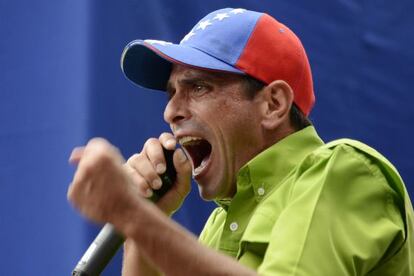Capriles urges supporters to reject Maduro’s government
Venezuelans go to the polls on Sunday to elect mayors and councilors across the country

Sunday’s municipal elections in Venezuela are being seen as a referendum on the government of President Nicolás Maduro, which has been grappling with a severe economic crisis fueled by massive food shortages, soaring consumer prices and high inflation.
Led by Miranda state governor and former presidential candidate Henrique Capriles, the opposition will try to use the race for mayors and councilors to also demonstrate that April’s election results, in which the contender lost by a narrow margin to Maduro, were rigged.
After Capriles was defeated by 1.49 percentage points, the opposition Democratic Union Committee (MUD) coalition publicly denounced hundreds of incidents of alleged fraud committed at ballot boxes across the nation, which its leaders believe threw the elections in Maduro’s favor. Forty-one-year-old Capriles has asked his supporters to go out and vote to show that the majority of Venezuelans reject Maduro’s leftist government.
Since the presidential race, Capriles has emerged as Venezuela’s most prominent critic of “Chavismo,” the movement created by the late President Hugo Chávez and carried on by his appointed successor Maduro.
The Venezuelan media has
During Chávez’s 15 years in office, opposition candidates usually faded away in obscurity following their election defeats. But the narrow margin in April, and continued questions about the voting result, has allowed Capriles to remain at center stage.
Even though he isn’t running in Sunday’s race, the governor has taken to the streets across the country to campaign on behalf of the opposition candidates. But the Venezuelan media has been resistant in giving him ample coverage.
Since the Globotelevisión network – which served as an official mouthpiece for the opposition – was pressured into folding under Chávez, Capriles and his supporters have limited media resources. The governor has also had public battles with the news portal Noticias 24, which has recently veered toward the government’s side and ignored the opposition’s campaigns.
Capriles and his group can only rely on newspaper coverage or television channels that broadcast via the internet from Miami, such as DemocraciaTV, GlobovisiónTV and El VenezolanoTV. A few independent news portals in Venezuela have also been covering his campaign, and Capriles has set up his own website, CaprilesTV, to get his message across.
In October, inflation soared to 54 percent, the highest figure in 16 years
Along with these difficulties, the opposition has faced uphill battles with the National Electoral Council (CNE), which has been slow to deal with complaints filed against Maduro and government-backed candidates for alleged election violations. Diego Arria, the former Venezuelan ambassador to the United Nations, who is a Maduro opponent, has quipped that the CNE should change its name to “the Elections Ministry.”
Among the issues, the CNE has not moved against the government for announcing that it will celebrate a tribute to the late Chávez on December 8 – the day of the elections. Chávez died on March 5 from cancer. CNE Tibisay Lucena has said that she cannot oppose a government decree.
Tensions in Venezuela have heightened over the past weeks after Maduro began enacting measures against private business for alleged price gouging after the National Assembly gave him special powers to govern by decree. He also announced that price caps on car sales will be introduced before Christmas.
Venezuelans have been suffering from severe shortages of food and basic consumer items, such as toilet paper, for months. In October, inflation soared to 54 percent, the highest figure in 16 years.
Maduro has blamed price speculators and the opposition for the country’s economic woes.
The president also publicly accused the opposition of committing sabotage against a major electrical power grid, which left almost the entire country without electricity for hours last Monday.
While the opposition has said that Sunday’s elections will be a litmus test on the Maduro government, the president and his supporters also see the race as a referendum on Capriles. According to expert analysts, the opposition could win between 100 and 120 mayoral races if its supporters go to the polls.
“If you don’t go out and vote, you are giving your ballot to the government,” said Capriles on Wednesday, during a campaign swing in Falcón state.
Tu suscripción se está usando en otro dispositivo
¿Quieres añadir otro usuario a tu suscripción?
Si continúas leyendo en este dispositivo, no se podrá leer en el otro.
FlechaTu suscripción se está usando en otro dispositivo y solo puedes acceder a EL PAÍS desde un dispositivo a la vez.
Si quieres compartir tu cuenta, cambia tu suscripción a la modalidad Premium, así podrás añadir otro usuario. Cada uno accederá con su propia cuenta de email, lo que os permitirá personalizar vuestra experiencia en EL PAÍS.
¿Tienes una suscripción de empresa? Accede aquí para contratar más cuentas.
En el caso de no saber quién está usando tu cuenta, te recomendamos cambiar tu contraseña aquí.
Si decides continuar compartiendo tu cuenta, este mensaje se mostrará en tu dispositivo y en el de la otra persona que está usando tu cuenta de forma indefinida, afectando a tu experiencia de lectura. Puedes consultar aquí los términos y condiciones de la suscripción digital.








































